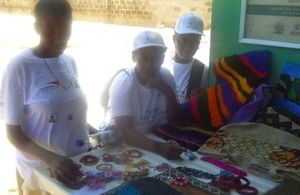Acting British High commissioner speech on Violence Against Women
To mark the International Day for the Elimination of Violence Against Women in Lusaka, Acting British High commissioner Lucy Joyce said;

Survivors of GBV display mechandise for sale
鈥淚 am pleased to be here at this press event organised by the just ahead of 25 November 鈥� International Day for the elimination of violence against women. It marks the start of an international campaign by the British Government through its missions overseas, 16 days of activism against Gender Violence, ending with Human Rights Day on 10 December.
鈥淓nding violence against women and girls is a priority for the UK at home and overseas. Around the world 35% of women and girls will experience some form of physical or sexual violence during their lifetime. Gender Based Violence is both a health and a human rights concern: it inflicts physical and emotional harm and prevents women from achieving their full potential. It strains health systems鈥� resources, limits women鈥檚 growth and productivity and impedes the well being of families and communities.
鈥淭he extent of the challenge in Zambia is huge, with almost half of adult women reporting violence, a third of women bearing a child before the age of 20 and some figures suggesting that 40% of women are married before the age of 18, many of them much younger.
鈥淶ambian Government has taken a strong lead in the fight against gender based violence with the implementation of the Anti-Gender based Violence Act, its leadership on child marriage and the recent launch of the HeforShe campaign by the President.
鈥淗owever, Zambia urgently needs to increase the number of shelters available for survivors of Gender Based Violence, and needs to accelerate both the implementation of the Anti-Gender Based Violence Act, and the establishment of the Fast-Track courts. I was pleased to see that the Ministry of Gender is also planning 16 days of Gender activism from Wednesday, including the police launch of HeforShe and the launch of the Fast Track Courts.
鈥淯K Government in Zambia: UK Government, through DFID, is providing a total of 拢2.3m to promote gender equality and women鈥檚 empowerment in Zambia.
鈥淚n Zambia, DFID is also providing 拢8m to support the Stamping Out and Prevention of Gender Based Violence programme (STOP GBV). We work alongside , the Zambian Government and others to establish one stop centres for Gender Based Violence across Zambia.
鈥淭hrough our Adolescent Girls Empowerment Programme (AGEP), DFID is providing 拢10.4 million to empower over 10,000 adolescent girls (aged 10-19) in both rural and urban Zambia to keep them healthy, in school and delay the age at which they become pregnant for the first time.
鈥淲e also support the Ministry of Gender in its valuable efforts to promote women鈥檚 empowerment and gender equality in the country (though the implementation of its Programme on the Promotion and Protection of Women and Children).
鈥淭hank you for coming here today, and thank you in advance for coming to the STOP GBV centre where you will hear survivors鈥� testimony, and see for yourselves the excellent work which is done in such centres.
鈥淭hank you.鈥�